Ambinder, E., Jennings, D., Blachman-Biatch, I., et al. The Resilient Social Network. @occupysandy #SuperstormSandy. Homeland Security Studies and Analysis Institute, 2013.
Biernacki, Patrick, and Dan Waldorf. “Snowball sampling: Problems and techniques of chain referral sampling.” Sociological methods & research 10, no. 2. 1981: 141-163.
Bosi, Lorenzo, Marco Giugni, and Katrin Uba, eds. The consequences of social movements. Cambridge University Press, 2016.
Browne, Simone. Dark matters: On the surveillance of blackness. Duke University Press, 2015. Center for Media Justice. The Digital Culture Shift: From Scale to Power. 2016. http://centerformediajustice.org/digital-culture-shift-from-scale-to-power/
Collins, Patricia Hill. Black feminist thought: Knowledge, consciousness, and the politics of empowerment. Routledge, 2002. Eubanks, Virginia. Automating Inequality. How High-Tech Tools Profile, Police, and Punish the Poor. St. Martin’s Press, 2018.
Evans, Will and Sinduja Rangarajan. “Hidden figures: How Silicon Valley keeps diversity data secret.” 2017. https://www.revealnews.org/article/hidden-figures-how-silicon-valley-keeps-diversity-data-secret
Faris, Robert, Hal Roberts, Bruce Etling, Dalia Othman, and Yochai Benkler. “Score another one for the Internet? The role of the networked public sphere in the US net neutrality policy debate.” 2015. Freedman Consulting, LLC. Here to There: Lessons Learned from Public Interest Law. 2016.
Freedman Consulting, LLC. A Pivotal Moment: Developing a New Generation of Technologists for the Public Interest. The Netgain Partnership, 2016.
Gaucher, Danielle, Justin Friesen, and Aaron C. Kay. “Evidence that gendered wording in job advertisements exists and sustains gender inequality.” Journal of personality and social psychology 101.1. 2011: 109
Hargittai, Eszter, and Kaitlin Jennrich. “The Online Participation Divide.” In The Communication Crisis in America, And How to Fix It, pp. 199-213. Palgrave Macmillan US, 2016.
Joseph, George. “Extreme digital vetting of visitors to the US moves forward under a new name.” Ars Technica. 2017. https://arstechnica.com/tech-policy/2017/11/extreme-digital-vetting-of-visitors-to-the-us-moves-forward-under-a-new-name/
Knight Commission on the Information Needs of Communities in a Democracy. Informing communities: Sustaining democracy in the digital age. Washington, D.C.: The Aspen Institute. 2009.
Knight Foundation. Knight Foundation: Trends in Civic Tech. http://www.knightfoundation.org/features/civictech/. Accessed 16 June 2016.
Koschinsky, Julia. Data Science for Good: What Problems Fit? 2015.
Landivar, Liana Christin. Disparities in STEM Employment by Sex, Race, and Hispanic Origin. ACS-24, U.S. Census Bureau. 2013.
Larsen, Selena. “How #RealDiversityNumbers is holding tech companies accountable.” DailyDot. 2015. https://www.dailydot.com/debug/realdiversitynumbers-diversity-tech
Lepri, Bruno, Nuria Oliver, Emmanuel Letouzé, Alex Pentland, and Patrick Vinck. “Fair, Transparent, and Accountable Algorithmic Decision-making Processes.” Philosophy & Technology. 2017: 1-17.
McCann, Laurenellen. Experimental Modes of Civic Engagement in Civic Tech. Edited by Daniel X. O’Neil, Smart Chicago Collaborative. 2015.
McNutt, John G., et al. “The Diffusion of Civic Technology and Open Government in the United States.” Information Polity, no. Preprint. 2016: 1–18.
Mikesell, Lisa, Elizabeth Bromley, and Dmitry Khodyakov. “Ethical community-engaged research: a literature review.” American journal of public health 103.12. 2013: e7-e14.
Munoz and Patil, 2016. Munoz, Cecilia, Megan Smith, and D. Patil. “Big data: A report on algorithmic systems, opportunity, and civil rights.” Executive Office of the President. The White House. 2016.
Nielsen, Laura Beth, and Catherine R. Albiston. “The Organization of Public Interest Practice:1975-2004.” North Carolina Law Review, vol. 84. 2005: 1591–622.
Omidyar Network. Engines of Change: What Civic Tech Can Learn from Social Movements. 2016. https://www.omidyar.com/spotlight/what-can-civic-tech-learn-social-movements
O’Neil, Cathy. Weapons of math destruction: How big data increases inequality and threatens democracy. Broadway Books, 2017; Eubanks, Virginia. Automating Inequality: How High-Tech Tools Profile, Police, and Punish the Poor. St. Martin’s Press. 2017.
O’Neil, Daniel X. CUTGroup: Civic User Testing Group As a New Model for UX Testing, Digital Skills Development, and Community Engagement in Civic Tech. Smart Chicago Collaborative. 2014.
Open Plans. Field Scan of Civic Technology. Living Cities, Nov. 2012. https://www.livingcities.org/resources/131-field-scan-of-civic-technology
Page, Scott E. The Difference: How the Power of Diversity Creates Better Groups, Firms, Schools, and Societies. Princeton University Press, 2008.
Patel, Mayur, et al. The Emergence of Civic Tech: Investments in a Growing Field. Dec. 2013. https://www.knightfoundation.org/media/uploads/publication_pdfs/knight-civic-tech.pdf
Pew. “Women are more concerned than men about gender discrimination in the tech industry.” 2017. http://www.pewresearch.org/fact-tank/2017/10/10/women-are-more-concerned-than-men-about-gender-discrimination-in-tech-industry
Rhode, Deborah L. “Public Interest Law: The Movement at Midlife.” Stanford Law Review, vol. 60, no. 6, 2008: 2027–86. Rumbul, Rebecca. Who Benefits from Civic Technology? mySociety, Oct. 2015. https://www.mysociety.org/files/2015/10/demographics-report.pdf
Schwartz, Robert, et al. The Voice of Nonprofit Talent: Perceptions of Diversity in the Workplace. Commongood Careers & Level Playing Field Institute, 12 Apr. 2011.
Starr, Christine R. “Mind the Gender Gap: Changing Misconceptions about Gender, Leadership, and Occupational Segregation.” 2017: 1-2.
Stempeck, Matt. “Towards a Taxonomy of Civic Technology.” Microsoft on the Issues, 27 Apr. 2016. http://blogs.microsoft.com/on-the-issues/2016/04/27/towards-taxonomy-civic-technology/
Tufekci, Zeynep. Twitter and tear gas: The power and fragility of networked protest. Yale University Press. 2017. Upturn. Civil Rights, Big Data, and Our Algorithmic Future. Sept. 2014.
Wengraf, Tom. Qualitative research interviewing: Biographic narrative and semi-structured methods. Sage, 2001.
